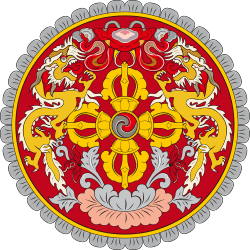Independence of Bhutan
Bhutan is one of the few countries which has been independent throughout its history like Nepal, never conquered, occupied, or governed by an outside power. Although there has been speculation that it was under the Kamarupa Kingdom or the Tibetan Empire in the 7th to 9th centuries, firm evidence is lacking. From the time historical records are clear, Bhutan has continuously and successfully defended its sovereignty.[1][2]
In 1910 under the Treaty of Punakha, Bhutan recognized the suzerainty of the British government in exchange for political autonomy. In August 1947, after India gained independence from Britain, kingdoms such as Bhutan were given the option to remain independent, or join the Indian Union. Bhutan chose to remain independent and on August 8, 1949, Bhutan's independence was recognised by India.
References
- ↑ Rose, Leo E. (1977). The Politics of Bhutan. Ithaca: Cornell University Press. p. 24. ISBN 0-8014-0909-8.
[T]here can be no doubt that since at least the tenth century no external power has controlled Bhutan, although there have been periods when various of its neighbors have been able to exert a strong cultural and/or political influence there.
- ↑ Aris, Michael (2005). The Raven Crown: The Origins of Buddhist Monarchy in Bhutan. Chicago: Serindia Publications. p. 15. ISBN 1-932476-21-0.
peripheral to the great empire of power and faith [i.e., Tibet], yet never subjugated to it.
| |||||||||||||||||||||||||||||||||||||||||||||
